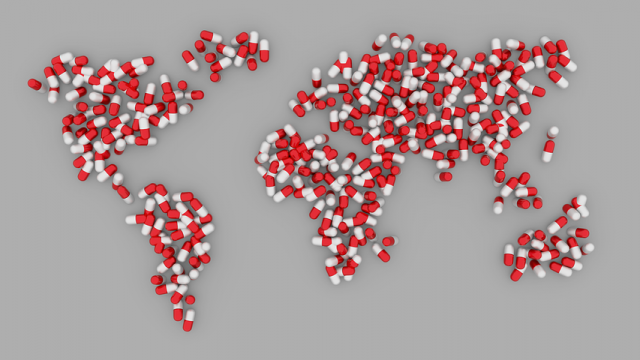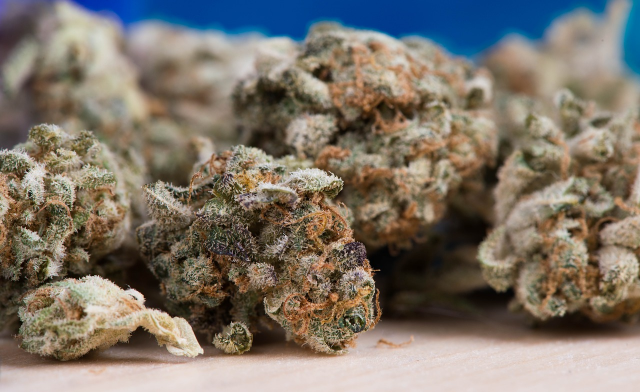Cannabis as an Alternative to Pharmaceuticals - by Emily Earlenbaugh, PhD. - #KushSmokers / Powered By Steem
Cannabis as an Alternative to Pharmaceuticals - by Emily Earlenbaugh, PhD(@emilyearlenbaugh). - #KushSmokers / Powered By Steem

Before I go too far into the reasons for replacing pharmaceuticals with cannabis, let me caveat the conversation. Cannabis is an amazing and incredibly versatile medicine, and patients report it helping with all kinds of problems. This is in part because cannabis helps with pain, inflammation, and immune responses, three problems present in so many conditions. Still, cannabis is not a cure-all and it can’t just replace everything. I still use a few pharmaceutical products for things like allergies, which cannabis doesn’t help me with. And there are plenty of medications which can’t be replaced by cannabis. Be sure to talk to a doctor before stopping any current medications and never stop a medication suddenly as this comes with it’s own dangers. Still, many commonly used medications CAN be replaced with cannabis, and probably should.
The most obvious reason to use cannabis is it’s safety. The research shows that cannabis is incredibly safe when compared to the alternatives. Many conventional medications can be severely addictive, dangerous and cause long term damage to your health.
The most common use of cannabis is as a pain-reliever; so I will focus on that for this piece. One study found 97% of patients using cannabis were using it for chronic pain. And a recent study by the National Academy of Sciences reported that there is substantial or even conclusive evidence that cannabis is an effective treatment for chronic pain. Since the majority of medical marijuana patients use it for pain management - it can be helpful to compare with the alternative pain-relievers available.
The Opiate Death Toll

The opiate epidemic is real. Over 33,000 people die each year from opiates and the rates are only increasing each year. Well.. actually… opiate related deaths did go down in some areas over the last few years- those states that legalized medical cannabis.
That’s right. In states that allow medical cannabis laws, deaths from opiate overdoses have gone down by 25%! With a safe alternative to opiates, patients needed to rely on them less. Cannabis as a great alternative. It not only replaces opiates in terms of pain relief, it can also help with the challenging process of withdrawing off of opiates.
Animal studies suggest that using cannabis can actually decrease one’s desire for opiates. One study showed that adolescent mice exposed to thc showed less addictive behaviors towards opiates. Human studies also show that cannabis use can ease the withdrawal process and increase success rates for quitting.
Over-the-Counter Pain Killers

Aspirin and other NSAID painkillers are incredibly common. These are medications that most people use on a regular basis for mild pain. It doesn’t require any special prescription and we even have versions of the drug marketed to children. It is in most medicine cabinets - and people use it for all kinds of normal aches and pains. A headache here, a pulled muscle there. Most people have taken these on more occasions than they can count and have it standing by, in case of pain. Others take it on a daily basis for some kind of chronic pain, or heart disease preventative.
But every year, thousands of people die from taking too much aspirin. You can easily overdose from these medications if you take too much at once. But even if you don’t overdose - over time, NSAIDS can lead to long term risks. Estimates have deaths from NSAID’s at over 15,000 a year, and hospitalization for complications caused by NSAIDS (like GI bleeding or liver damage) are in the 100,000 range.
Cannabis as an Alternative in 2017

People have been using cannabis all this time, but there have been no recorded fatalities from taking cannabis in our entire 12,000 year history with the plant. Because there is no known toxicity for cannabis, patients can increase their intake with their needs and not have to worry about overdosing.
It is also a substance that is not chemically addictive, so while people can become habitually attached to the habit of using cannabis, they won’t go through the intense and dangerous withdrawal process associated with addictive pain pills like opiates.
While cannabis is still a Schedule 1 Drug, making it difficult to study the benefits of cannabis, funding for studies aimed at discovering harms from cannabis has been readily available and many studies have been done on the topic. Still, researchers havn’t been unable to come up with much. While we are still investigating potential risks - and it is possible there are some - what we have found pales in comparison to the death toll associated with other painkillers. And there are many other uses for cannabis.
I have personally replaced benzos, antidepressants, sleeping pills, and all medications for my nausea and digestive problems with cannabis. Cannabis not only replaced these medications for me, they work much better - and don’t give me the same negative side effects. What negative side effects I got from cannabis, I was able to eliminate by honing in on the best cannabis options for me. And it’s great that I now use just one medication - cannabis- instead of mixing all these different medications.
If you think cannabis might be a good fit for you and want to get started shifting to a healthier medicine, be sure to talk a cannabis specializing doctor. A doctor can look over your current medication list and let you know which of your medications are safe to swap out with cannabis, and what cannabis options might be especially helpful when you do. Pain management is just one area where cannabis is a viable replacement for prescription options, but it illustrates why many are making the change to this safe alternative.
-Dr. Emily Earlenbaugh
🔥🔥 Emily is a freelance @KushSmokers author and we hope everyone enjoys her Steem articles. She is new to the Steem community and was introduced to it through the #KushSmokers onboarding program, so please take a second, follow Emily, as she will be posting on her own account as well as under the @KushSmokers handle, alongside many other new high quality authors such as Emily in the near future!🔥🔥
Read Her Introduction Post Here:
https://steemit.com/kushsmokers/@kushsmokers/welcome-our-first-freelance-kushsmokers-author-why-i-left-academia-to-teach-people-about-cannabis-by-emily-earlenbaugh-phd-my
And her latest posts here:
https://steemit.com/kushsmokers/@kushsmokers/how-the-terpenes-in-cannabis-affect-your-high-and-you-by-emily-earlenbaugh-phd-kushsmokers-powered-by-steem

Don't forget to Upvote, Follow & Resteem to help support #KushSmokers around the world!
You also might want to follow us on Instagram @KushSmokers_!
I'm in! I just upVoted and Followed.
Much appreciated @loveon 😊👍
Juicing cannabis is another great way to boost your health without the high. But, I enjoy the high, it also heals. Especially with stress, depression, etc. Enjoyed your writing style. Upvoted and followed.
Juicing is a great way to use cannabis- I can say that for me- I very much feel high from juiced cannabis. In many cases it causes more of a head change for me than smoking it. But this can vary from patient to patient, and many others report that they don't feel high. Either way juicing is wonderful because it keeps all the fresh compounds naturally present in the plant 🌱 plus it is delicious 😋
I meant to say raw cannabis. I read somewhere that its impossible to get high from raw weed. I have tried it and never felt nothing. I suppose only when the cannabis has been dried?
I figured you meant raw- you can't really juice it when it is dry 😉
The high is very different and more energetic than with the smoked version of the same strains, but for many there is a high. This isn't a bad thing, it's more about whether that is a functional high for you or not. I've read and heard people saying it is impossible to get high from raw cannabis or from cbd, but no one has shown me data to support it. Really they mean you won't get affected by delta 9 thc in its decarboxilayed form. You won't get that kind of high. While you get affected differently- these can certainly have affects that alter your mood or perceptions or cognitive abilities in some.
That makes a lot of sense! Thanks for the knowledge. Will be reading more of your content. I always enjoy learning about cannabis. ✌
@emilyearlenbaugh which strain is the best for benzo/anxiety, etc?
This can vary person to person. In my online course (link in my bio)I give tools and tips on how to find strains that work best for your own biochemistry. For me, heavy indicas worked best. Strains like grape ape and Hindu Kush. I also found that edibles were essential because I could easily adjust my dosage accordingly with my withdrawal symptoms and they were the most effective at relaxing my muscles which were very tense from the withdrawal.
i wish i could upvote this more.
thank you for the advice. i have a friend that is looking into alternative treatments. I will def show this to him and assign him and his doc some research as well.
Thanks @wetthebreak 😊🙏 glad to be a help
fuck big pharm, smoke some weed!
This post received a 1.1% upvote from @randowhale thanks to @decentralizd! For more information, click here!
Smoke weed everyday ,420
It's been around a lot longer than Big Pharm.
I agree that you are definitely better taking cannabis then anything over the counter.
Thank you for furthering my knowledge on this topic
Thanks for reading @arckrai 🙏😊
Cannabis is not alternative it is the cure! All other painkillers and pills should be labeled as alternative to cannabis!!! We are eathing the propaganda of big pharma companies and thats why we will always first pay for the pills and then try to find alternative when they dont work!